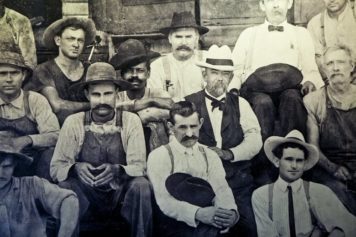Celebrating its 150th anniversary, the Jack Daniel’s whiskey brand is opting to share a part of its history that has never been told before.
Up until now, the company’s history has been centered on the notion that revered founder Jack Daniel learned to distill his now famous whiskey from a minister named Dan Call. Tour guides at the company’s Lynchburg, Tennessee distillery are now telling a different story; Daniel was actually taught to distill by Nearis Green — an enslaved Black man owned by Call.
According to The New York Times, this version of Jack Daniel’s history has never been a secret, but it is one that the company has only recently begun to embrace through tours of its facility, marketing campaigns and social media.
“It’s taken something like the anniversary for us to start to talk about ourselves,” said Jack Daniel’s in-house historian Nelson Eddy.
Green’s crucial role in the Jack Daniel’s whiskey-making process was referenced in the 1967 biography, “Jack Daniel’s Legacy,” by Ben A. Green. In the book, Call reportedly tells his slave (Green) to teach Daniel everything he knows.
“Uncle Nearest is the best whiskey maker that I know of,” the book quotes Call saying.
The art of whiskey making has long been deemed a “lily-white affair,” but the South’s dark history of slavery and whiskey are totally intertwined. Enslaved men made up the bulk of the distilling work force and often had crucial skilled roles in the whiskey-making process, The New York Times reports.
Enslaved Black Americans had their own traditions of alcohol production, too, traditions that traced all the way back to West Africa.
Many see Jack Daniel’s decision to reveal its ties to slavery as a move to appeal to younger drinkers who are more socially aware of America’s hidden racial politics. Others see it as a genius marketing tactic.
“When you look at the history of Jack Daniel’s, it’s gotten glossier over the years,” said Peter Krass, author of “Blood and Whiskey: The Life and Times of Jack Daniel.” “In the 1980s, they aimed at yuppies. I could see them taking it to the next level, to millennials, who dig social justice issues.”
The company said it is simply trying to set the record straight.
A year after slavery ended with the ratification of the 13th Amendment, Daniel opened his own distillery and employed two of Green’s sons, The New York Times reports. However, as corporate history-keeping was an uncommon practice at the time, the crucial roles and contributions of Green and his sons eventually slipped into the background.
“I don’t think it was ever a conscious decision” to leave the Greens out of the company’s story, said Phil Epps, the global brand director for Jack Daniel’s at Brown-Forman.
According to the news publication, Jack Daniel’s decided to share Green’s contributions after years of researching the company’s various origin stories. Green’s vital role at the company was one that couldn’t be ignored.
“As we dug into it, we realized it was something that we could be proud of,” Epps said.
Jack Daniel’s is taking things slow for now, remaining aware that the story of an enslaved American making whiskey might not be a huge selling point for its customers.
“The Green story is an optional part of the distillery tour, left to the tour guide’s discretion, and the company is still considering whether it will flesh out the story in new displays at its visitors center,” The New York Times stated.
